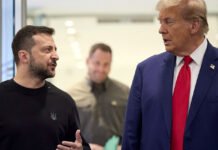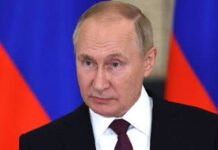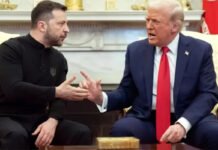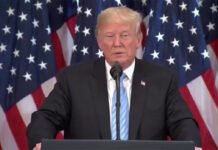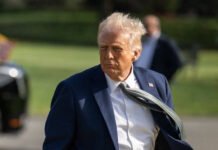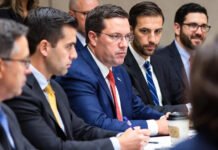In a dramatic shift that stunned both allies and adversaries, U.S. President Donald Trump walked back his earlier posturing on imposing a 100% tariff on countries purchasing Russian energy, leaving analysts and diplomats scrambling to decipher his real intentions. At a White House press conference originally meant to discuss the Los Angeles 2028 Olympics, the conversation veered sharply toward global trade tensions, energy policy, and an unexpected upcoming meeting with Russian President Vladimir Putin.
This unfolding development marks a pivotal moment in Trump’s foreign policy narrative. It raises questions about India’s future with the U.S., China’s immunity, and whether Trump’s unpredictable diplomacy is alienating America’s strongest partners.
The Moment Everything Changed: Trump’s Evasive Response
At Tuesday’s presser, when asked point-blank about his administration’s plans to levy a 100% tariff on countries that continue buying energy from Russia, Trump offered a cryptic answer.
“I never said the percentage, but we will take very strict action on this. Let’s see what happens in the coming time. We have a meeting with Russia tomorrow.”
This non-denial has led to fevered speculation. Was this a strategic backpedal? Or a veiled message to nations like India, which continues to import discounted Russian crude?
Trump’s tone shifted noticeably when the topic was broached, suggesting internal conflict or reconsideration. While no concrete percentage was committed, the phrase “very strict action” suggests that the tariff threat remains active, albeit shrouded in ambiguity.
Why the Sudden Mention of a Putin Meeting?
The timing of Trump’s announcement about an imminent meeting with Vladimir Putin raises eyebrows. Scheduled just a day after the press conference, this development was not part of the original agenda. It adds new complexity to U.S.-Russia relations, especially in the wake of continued sanctions, war support allegations, and tensions surrounding energy supply chains.
Is this meeting an olive branch or a negotiation tactic? Either way, Trump’s announcement has already changed the geopolitical climate.
India in the Crossfire: Tariff Hints and Diplomatic Tightrope
Among the countries watching the press conference closely, India may have the most to lose. The nation has defended its continued oil imports from Russia as a matter of strategic necessity and economic logic. But Trump’s veiled threat to impose tariffs “substantially more than 25%” on Indian goods adds a new layer of pressure.
In an interview cited in multiple reports, Trump reportedly stated:
“They [India] are promoting the war machine, and if they are going to do this, I will not be happy.”
This statement, while indirect, paints India as a participant in funding Russia’s war effort—an accusation that could have dire implications for U.S.-India trade and diplomatic relations.
Nikki Haley Strikes Back: Calls Out China Exception
In a sharp rebuke, former U.S. Ambassador to the U.N., Nikki Haley, challenged Trump’s selective enforcement. Posting on X (formerly Twitter), Haley accused Trump of playing favorites:
“India should not buy oil from Russia, but China, which is both an adversary and the biggest buyer of Russian-Iranian oil, is getting a 90-day tariff exemption. Why punish a trusted ally and let a rival walk free?”
Haley’s criticism highlights a growing rift within the Republican establishment, where traditional foreign policy hawks are now clashing with Trump’s unorthodox and often contradictory strategies.
Double Standards: China Gets a Pass?
Trump’s reluctance to name China in his tariff threats, while singling out India and other partners, has sparked widespread criticism. Despite being the largest importer of Russian energy, China was granted a temporary 90-day reprieve on tariffs. This has raised serious questions about Trump’s trade policy consistency and whether China’s economic leverage is deterring him from full retaliation.
Critics point out that such exemptions undermine the moral high ground Trump claims to hold. If fighting the Russian war machine is the priority, why allow China, its biggest funder, to walk free?
Trump’s Knowledge Gap: U.S. Imports from Russia
In a surprising twist, Trump admitted to not knowing about U.S. imports of Russian chemicals and fertilizers, which include uranium hexafluoride, a crucial element for America’s nuclear and agricultural industries. When Indian officials cited these imports, Trump responded:
“I do not know anything about it. We will have to investigate it.”
This admission weakens his case against countries like India, which could argue they are simply following the same model—buying what’s economically viable without violating any international sanctions.
Trump Claims He Stopped 5 Wars—Including India-Pakistan?
During the same press conference, Trump shifted focus to his self-proclaimed peace-making record:
“I have stopped five wars in the last five months. And to be honest, I want this sixth war to stop as well… including the India-Pakistan conflict.”
While such a claim lacks public documentation, it plays into Trump’s narrative of being a deal-maker and peace-broker, potentially softening the blow of his tariff threats. Yet, this same narrative makes his hardline stance on India more perplexing.
Economic Fallout: What’s at Stake for India?
If Trump proceeds with higher tariffs on Indian imports, the consequences could be severe for sectors like:
Pharmaceuticals
Information Technology services
Textiles and apparel
Automobile components
These industries depend heavily on access to the U.S. market, and punitive tariffs could deal a serious blow to India’s export-driven economy.
Moreover, such a move risks derailing defense deals and strategic partnerships built over the last decade between Washington and New Delhi.
The Bigger Picture: Trump’s Circle Tightens
Trump’s latest comments reveal a recurring theme in his governance: isolation. Whether by alienating allies or pivoting unexpectedly toward adversaries, his approach is increasingly characterized by unpredictability and impulsiveness.
Nikki Haley’s public criticism is more than just political rivalry—it represents a fracturing Republican foreign policy doctrine, one that could shape the 2024 U.S. Presidential election narrative.
What Happens Next?
The upcoming Trump-Putin meeting could provide clarity—or deepen the mystery. Will Trump negotiate energy stability, or use it as leverage for broader geopolitical bargaining? Will India face real tariffs, or was this just bluster?
Until those questions are answered, one thing is certain: Trump’s unpredictable moves have once again put the world on edge.
Conclusion: A Strategic Gamble with Global Stakes
President Trump’s retreat from the 100% tariff threat—and his vague, ominous statements—signal more than a shift in trade policy. They reveal a complex, potentially volatile geopolitical strategy that risks undermining long-standing alliances, empowering adversaries, and redrawing the global economic map.
As India braces for potential fallout and China enjoys a temporary reprieve, all eyes now turn to Trump’s next move—particularly in his meeting with Putin. The stakes are high. The message is mixed. And the world is watching.


